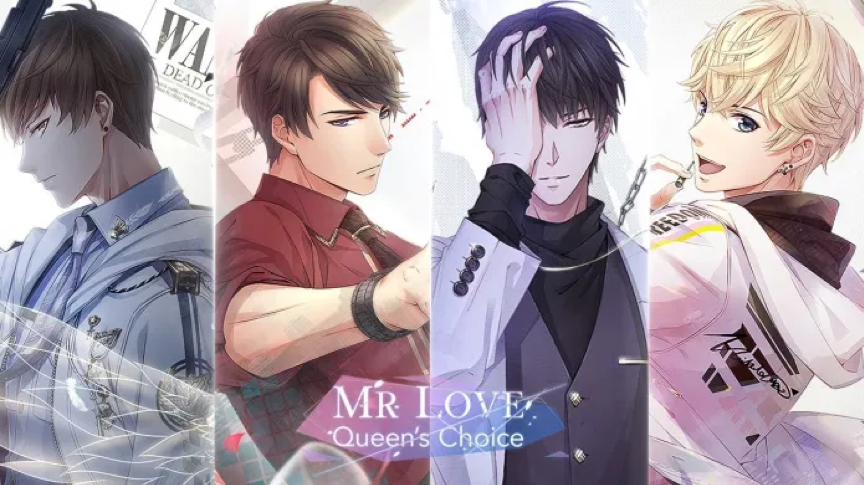
Nowadays, more and more young people have labeled themselves as "anti-social". Under rapidly developing technology and communication facilities, face-to-face social interaction and "old-school" dating habits have lost their importance and romantic meanings. How should young people deal with the demands for romantic intimacy then?
The Japanese homebody who announced his marriage to the virtual character Hatsune Miku five years ago is no longer the only case anymore. Influenced by both single economy and anti-social youngsters' hidden desire to be loved and cured, virtual relationship simulation role-playing games are booming.
In Japan, the origin of dating simulation games, companies that specialize in female-oriented dating simulation games could generate USD $100 million 5-6 years ago. One of these leading companies, Voltage, claimed they had more than 60 million players worldwide in 2018. In the United States, interactive experience games represented by the Episode and Choices series, have also sprung up among match-3 games, casino games, and strategy games, occupying a high position in the game sales list.
In China, the release of a phenomenal mobile game, Mr. Love: Queen's Choice has sparked a surge in the popularity of dating simulation games. More and more top manufacturers began to develop dating simulation games, especially those games aimed at female consumers.

The SHEconomy behinds “Her Heart”
Dating simulation games aimed specifically at women are also called "otome-games" (or Maiden Games), in Japanese, "Otome" refers to "unmarried young girls". This demographic has the purest longing and fantasy for love, which provides the soil for the development of Otome Game. In otome-games, users can experience different romantic partners in the virtual world.
In the Chinese market, otome-games are undoubtedly in the golden period of development considering factors such as the single rate, independence, and consumption power of women.
The selling points of otome-games are character sets and story plots. On most occasions, Chinese domestic otome-games need to use virtual currency to draw cards from the card pool and constantly unlock more possibilities with characters by the character cards during the game. Mr. Love: Queen's Choice, the milestone in Chinese otome-games, also follows the game logic of drawing cards. When the game was released in 2017, it occupied the female player market immediately, even surpassing the Honor of Kings in the game download list. By January 2018, Mr. Love: Queen's Choice reached $50 million revenue within a year, demonstrating the significant purchasing power and enthusiasm of its players.
With the She-conomy continuously heating up, the popularity of otome-games has broken the dominance of male-oriented games. More female players are growing significantly in China. Stats shos that active female players reached 582 million in early 2022. In recent otome-games, female characters are no longer male vassals, but gradually become independent personalities and grow continuously.
Some leading gaming companies including Tencent, NetEase, ByteDance, and IGG have recently joined the female-oriented love simulation game market respectively. So far, the domestic otome-games are dominated by Mr. Love: Queen's Choice, Light and Night, For All Time, and Tears of Themis.
Game revenue in September 2022:
| Game Title | iOS Revenue (USD) |
| Tears of Themis | $1,430,000 |
| Mr. Love: Queen's Choice | $1,000,000 |
| Light and Night | $2,860,000 |
| For All Time | $570,000 |
These games and their players have experienced many ups and downs together, the current state of both the game and the player community has tended to be stable and relatively fixed.
Taking Mr. Love: Queen's Choice as an example, after experiencing explosive growth, the MAU of Mr. Love: Queen's Choice has remained at around 620,000 in the third quarter of 2022, and the average duration per capita per remained at around 45.5 minutes, which indicates that players have developed daily gaming habits already. Light and Night has a relative growth, reaching around 1.9 million MAUs in Q3 2022, with more than an hour of daily usage per capita at 60.5 minutes.
Although the classic games market share in China has been relatively stable, otome-games is undoubtedly a prospective niche market with ample opportunities for game developers. One of the biggest challenges of otome-games is that they have a relatively small niche. For example, Mr. Love: Queen's Choice, Light and Night is 0.14% and 0.26% of the entire online population in China respectively. However, those dating simulation games often achieve strong user stickiness in the process of selling emotions and accompaniment. Though it is hard for them to "break the circle" and attract new players continuously, they can still go far with the support of existing players.

Gal-game: Beyond Awkward Male-Oriented Dating Simulation Games, the Virtual Romance Experience for Male Players
Gal-game is short for "Girl And Love Game", which are dating simulation games especially for male players. Compared to female-oriented otome-games, Galgame is more likely to succeed and has led to many well-known animated adaptations. However, Galgame's development in China and other countries is also facing challenges. Although the market demand has been expanding, and unique themes and wonderful content have been continually created, Galgame is sometimes stigmatized as "adult games" in East Asian.
Practitioners report that the review process for Galgames on STEAM has become increasingly strict over the past two years, contents that do not solicit sexual attention may also fail to pass. Additionally, Galgames looking to be introduced into the Chinese market must have game version numbers. Failure to pass the review process and get the version number means that the game has no chance to access the Chinese market.
In the meantime, more Galgames seek to move from PC to mobile, while "visual novel" has become a potential solution for them. Some all-ages Galgames are attempting to change the game into more accessible visual novels for Chinese audiences. Publishers are hoping to make the artworks first available on platforms like TapTap or BiliBili, where the ACG lovers are, so that more players can engage with the Galgame style through high-quality artworks.

The Chinese Galgame market has big potential. For instance, CrazyOnes, which combines the idea of "Dating Simulation + CCG Fighting system" opens a new sub-genre. Keeping in the balance between dating and fighting is an essential topic for the game developers. As a Galgame, the excessive focus on numerical value during the fighting and cultivating processes can negatively affect the overall game experience. For male-oriented dating simulation games, what the game developer should also consider is how to market it and how to monetise.
AI will continuously increase the dating simulation game market. The emergence of AI language models such as ChatGPT is definitely pushing the market for AI-powered dating simulation games forward. ChatGPT and similar language models can generate natural-sounding responses to a wide range of prompts, allowing for more fluid and realistic conversations between players and virtual characters. This means that game developers can create more sophisticated and nuanced dialogue options for their games, leading to a more immersive and engaging experience for players. Although there are differences between virtual romance and the real world, some users point out that AI is more active in responding to emotions than real lovers. The promotion of chatbots is similar to dating simulation games to some extent. iGirl, iBoy, and Anima are all romance-oriented chatbots, and there are also players who ask Chatgpt about love. One of Douban community groups: "Human-AI Love" has gathered nearly 10,000 users already, most of whom actively shares their love life with the online conversation software Replika. We predict that emotional artificial intelligence will grow exponentially.










